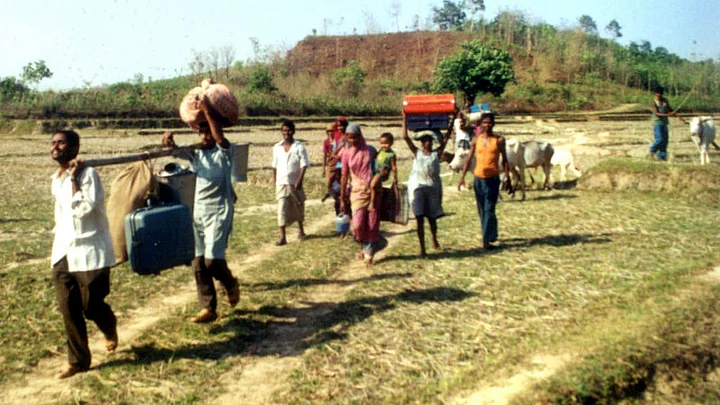As Indian and Bangladesh authorities work out the modalities for the exchange of nearly 200 enclaves on both sides of the border, an estimated 50,000-100,000 enclave dwellers now see a bright ray of hope towards attaining Indian citizenship.
Almost all of the enclave dwellers — Indian nationals who reside in Indian enclaves within Bangladeshi territory, along with Bangladeshi nationals who live in Bangladesh enclaves surrounded by Indian territory — want to be citizens of India.
Since 1947, “tens of thousands of people (have been) living beyond the reach of state and nation in dozens of enclaves in South Asia,” wrote Dutch scholar Willem van Schendel. Over time, most Bangladeshi enclave dwellers procured identity documents, including ration cards and voter IDs, but a vast majority of them could not vote and had immense difficulty to avail of healthcare and education facilities.
The Land Boundary Agreement
Speaking with The Quint over phone, the Dinhata-based General Secretary of the Bharat-Bangladesh Enclave Exchange Coordination Committee (BBEECC), Deeptiman Sengupta, said emphatically that, “people living in the enclaves in both Bangladesh and India are overjoyed by the ratification of the Land Boundary Agreement (LBA) by the Indian Parliament. They are now making preparations to apply for Indian citizenship.” Sengupta expects a flood of applications once President Pranab Mukherjee gives ascent to the ratified LBA.
While the operationalisation of the LBA would mean an exchange of territory, the issue of citizenship will have to be done in accordance with the provisions of the Indian Citizenship Act, 1995. The responsibility for processing applications for Indian citizenship rests with the governments of West Bengal, Meghalaya and Assam — states in which 71 Bangladeshi enclaves — “bewildering territorial arrangements,” as van Schendel describes them — are located. There are as many as 102 Indian enclaves in Bangladesh.
Under the terms of the LBA, which was ratified by the 119th Constitutional Amendment in the closing days of the budget session of Parliament, the enclave dwellers could choose to continue living in their present locations or move to their country of choice.
Questions of Nation and State
Given the prevailing political, economic and social conditions in India and Bangladesh, the enclave dwellers are expected to behave as rational actors and choose Indian citizenship. “It is natural that Indian citizenship brings with it advantages that the enclave dwellers can never ever dream about in Bangladesh,” Sengupta said.
Sengupta’s organisation, which has a Bangladeshi chapter too, has urged the Mamata Banerjee government to quickly proceed with rehabilitation of the Bangladeshi enclave inhabitants, based on the census survey conducted in these “geographical curiosities” where they lived virtually as stateless people, beyond the orbit of either India or Bangladesh, and where nation and state are highly contested and complicated notions.
The gathering momentum of citizenship aspiration has forced the BBEECC to urge the Trinamool Congress government to speed up development work in these enclaves, which for years together were neglected islands of one state completely surrounded by the territory of another (India). Sengupta said that the enclave dwellers should be stakeholders in the development process.
